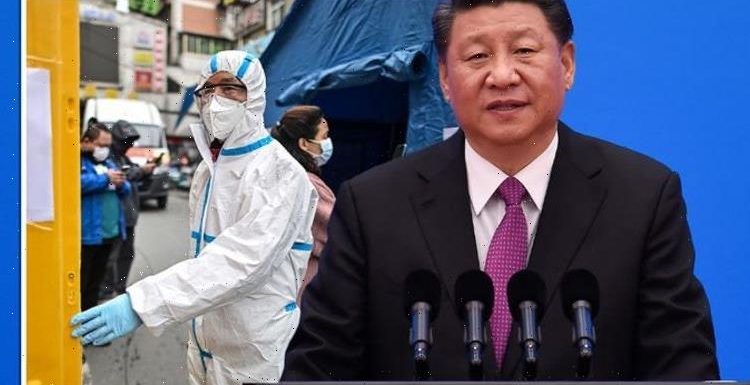
US intelligence agencies looking into data from Wuhan lab
We use your sign-up to provide content in ways you’ve consented to and to improve our understanding of you. This may include adverts from us and 3rd parties based on our understanding. You can unsubscribe at any time. More info
World Health Organization (WHO) investigators are now racing against the clock to pinpoint the origin of the COVID-19 pandemic. Their work has been branded a “global priority” but the Chinese government is said to have hindered any significant progress. Although it is believed the SARS-CoV-2 coronavirus was transmitted to humans from an animal source, questions still remain about the virus leaking from the Wuhan Institute of Virology (WIV) in Hubei province.
In a new report published in the journal Nature, WHO scientists have warned their inquiries have “stalled” – and the damage caused by further delays could be irreparable.
The same team of investigators published in March this year a report that zeroed in on Wuhan’s Huanan wet market as a probable source of the pandemic.
But the findings were not conclusive enough to warrant an end to the investigation.
The scientists have now called for a “fast-track” follow-up to analyse in greater detail the pandemic’s origin.
The WHO investigators wrote: “The window of opportunity for conducting this crucial inquiry is closing fast: any delay will render some of the studies biologically impossible.


“Understanding the origins of a devastating pandemic is a global priority, grounded in science.”
Huanan market emerged as a probable source early on in the pandemic, due to its bustling stalls filled with all sorts of wild and domesticated animals being kept in close proximity to humans.
Bats and pangolins were originally pegged as likely culprits, with the latter being all but eliminated in later investigations.
The coronavirus family of pathogens is zoonotic, meaning it can jump from animals to humans.
Following the WHO’s investigation, it was revealed the virus had been spread around the wet market as early as December 2019.
But even this origin theory has been inconclusive and the Chinese government has been spreading an alternative idea: the coronavirus was initially transmitted through frozen food.
Many also believe the virus may have leaked from a secretive Chinese facility in Wuhan.
Wuhan lab researchers handle bats in 2017 promo footage
Scientists at the WIV have strongly denied this possibility, claiming they have never handled the SARS-CoV-2 strain of coronavirus.
Earlier this year, US President Joe Biden called for an investigation into the theory, lending it more weight.
He has now received the results of a US probe into the lab leak theory, although the classified document is reported to have not made any breakthroughs.
Under the terms of a deal struck between the WHO and China, the WHO’s investigators would not look into the lab leak theory.
Instead, they focused on reviewing some 76,000 patient files, as well as studying patients hospitalized in Wuhan and the wider Hubei province in the second half of 2019.
The researchers then looked at food supply chains leading back to Huanan market and tested a wide range of livestock for the novel coronavirus.


In January this year, the investigators carried out a 28-day mission to interview medical, clinical and laboratory professionals.
The investigators noted: “We found the laboratory origin hypothesis too important to ignore, so brought it into the discussions with our Chinese counterparts.
“And we included it as one of the hypotheses for SARS-CoV-2 origin in our report.”
However, they noted the Chinese team “was and still is reluctant to share raw data”, citing issues with patient confidentiality.
The Chinese government has also refused to cooperate with the WHO on the second stage of its investigation of the country’s laboratory practices.
Zeng Yixin, China’s vice-minister of health, said late in July the WHO’s proposal has shown “disrespect for common sense and arrogance towards science”.
Following the release of the March report, the WHO investigators said China had shared much more new information.
In July this year, the WHO announced the creation of a committee that will oversee future studies into the origins of the virus.
But the investigators are concerned these efforts could hinder ongoing investigations, leading to “several months of delays”.
In particular, the various member states and involved parties would have to negotiate the terms of investigating laboratory practices in China – a key area the WHO investigators want to pay closer attention to.
The researchers added: “The search for the origins of SARS-CoV-2 is at a critical juncture.
“There is a willingness to move forward from both the WHO international team and the Chinese team.
“Crucially, the window is rapidly closing on the biological feasibility of conducting the critical trace-back of people and animals inside and outside China.”
Source: Read Full Article